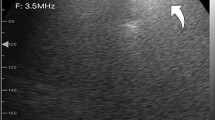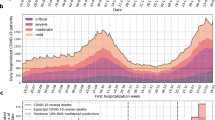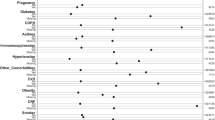Abstract
COVID-19 has been spread to many countries all over the world in a relatively short period, largely overwhelmed hospitals have been a direct consequence of the explosive increase of coronavirus cases. In this dire situation, the demand for the development of clinical decision support systems based on predictive algorithms has increased, since these predictive technologies may help to alleviate unmanageable stress on healthcare systems. We contribute to this effort by a comprehensive study over a real dataset of covid-19 patients from a local hospital. The collected dataset is representative of the local policies on data gathering implemented during the pandemic, showing high imabalance and large number of missing values. In this paper, we report a descriptive analysis of the data that points out the large disparity of data in terms of severity and age. Furthermore, we report the results of the principal component analysis (PCA) and Logistic Regression (LR) techniques to find out which variables are the most relevant and their respective weight. The results show that there are two very relevant variables for the detection of the most severe cases, yielding promissing results. One of our paper conclussions is a strong recommendation to the local authorities to improve the data gathering protocols.
Access this chapter
Tax calculation will be finalised at checkout
Purchases are for personal use only
Similar content being viewed by others
References
Aljaaf, A.J., Mohsin, T.M., Al-Jumeily, D., Alloghani, M.: A fusion of data science and feed-forward neural network-based modelling of COVID-19 outbreak forecasting in Iraq. J. Biomed. Inform. 118, 103766 (2021)
Chung, H., et al.: Prediction and feature importance analysis for severity of COVID-19 in South Korea using artificial intelligence: model development and validation. J. Med. Internet Res. 23(4), e27060 (2021)
Curigliano, G., et al.: Recommendations for triage, prioritization and treatment of breast cancer patients during the COVID-19 pandemic. The Breast 52, 04 (2020)
Gawriljuk, V., et al.: Machine learning models identify inhibitors of SARS-COV-2. J. Chem. Inf. Model. 61, 4224–4235 (2021)
Kakade, A., Kumari, B., Dholaniya, P.S.: Feature selection using logistic regression in case-control DNA methylation data of Parkinson’s disease: a comparative study. J. Theor. Biol. 457, 14–18 (2018)
Khaliq, O., Phoswa, W.: Is pregnancy a risk factor of COVID-19? Eur. J. Obstet. Gynecol. Reprod. Biol. 252, 06 (2020)
Krysko, O., et al.: Artificial intelligence predicts severity of COVID-19 based on correlation of exaggerated monocyte activation, excessive organ damage and hyperinflammatory syndrome: a prospective clinical study. Front. Immunol. 12 (2021)
Lai, L., et al.: Digital triage: novel strategies for population health management in response to the COVID-19 pandemic. Healthcare 8(4), 100493 (2020)
Lastinger, L., Daniels, C., Lee, M., Sabanayagam, A., Bradley, E.: Triage and management of the ACHD patient with COVID-19: a single center approach. Int. J. Cardiol. 320, 06 (2020)
Levenfus, I., Ullmann, E., Battegay, E., Schuurmans, M.: Triage tool for suspected COVID-19 patients in the emergency room: AIFELL score. Braz. J. Infect. Dis. 24, 08 (2020)
Ng, J.J., Choong, A.M.T.L., Ngoh, C.L.Y.: A proposed scoring system for triage of patients who require vascular access creation in times of COVID-19. J. Vasc. Surg. 72(3), 1150–1151 (2020)
Pinto, G.P., Vavra, O., Marques, S.M., Filipovic, J., Bednar, D., Damborsky, J.: Screening of world approved drugs against highly dynamical spike glycoprotein of SARS-CoV-2 using CaverDock and machine learning. Comput. Struct. Biotechnol. J. 19, 3187–3197 (2021)
Rajbahadur, G.K., Wang, S., Ansaldi, G., Kamei, Y., Hassan, A.E.: The impact of feature importance methods on the interpretation of defect classifiers. IEEE Trans. Softw. Eng. 48(7), 2245–2261 (2021)
Sayed, S., Elkorany, A., Sayed, S.: Applying different machine learning techniques for prediction of COVID-19 severity. IEEE Access 9, 135697–135707 (2021)
Wallis, P., Gottschalk, S., Wood, D., Bruijns, S., De Vries, S., Balfour, C.: The cape triage score - a triage system for South Africa. S. Afr. Med. J. 96, 53–6 (2006)
Wang, M., et al.: Deep learning-based triage and analysis of lesion burden for COVID-19: a retrospective study with external validation. Lancet Digital Health 2, e506–e515 (2020)
Acknowledgments
The authors would like to express their gratitude to Fundación Vital for the financial support to the project “Aportaciones de Modelos Predictivos para COVID-19 basados en Inteligencia Artificial específicos para el Territorio Histórico de Alava - COVID19THA”. In addition authors thank to the group “Nuevos desarrollos en salud” of Bioaraba and to Osakidetza-Servicio Vasco de Salud for their collaboration.
Author information
Authors and Affiliations
Corresponding author
Editor information
Editors and Affiliations
Rights and permissions
Copyright information
© 2022 Springer Nature Switzerland AG
About this paper
Cite this paper
Badiola-Zabala, G., Lopez-Guede, J.M., Estevez, J., Graña, M. (2022). On the Analysis of a Real Dataset of COVID-19 Patients in Alava. In: García Bringas, P., et al. Hybrid Artificial Intelligent Systems. HAIS 2022. Lecture Notes in Computer Science(), vol 13469. Springer, Cham. https://doi.org/10.1007/978-3-031-15471-3_5
Download citation
DOI: https://doi.org/10.1007/978-3-031-15471-3_5
Published:
Publisher Name: Springer, Cham
Print ISBN: 978-3-031-15470-6
Online ISBN: 978-3-031-15471-3
eBook Packages: Computer ScienceComputer Science (R0)




